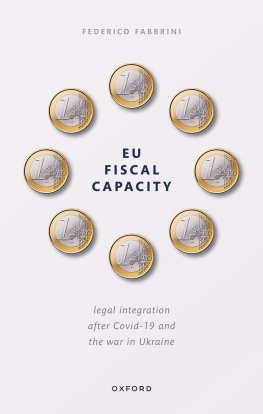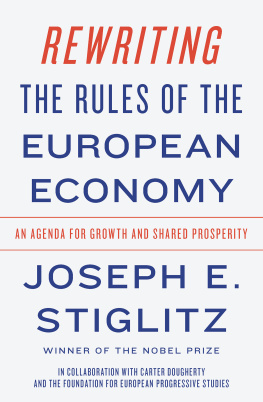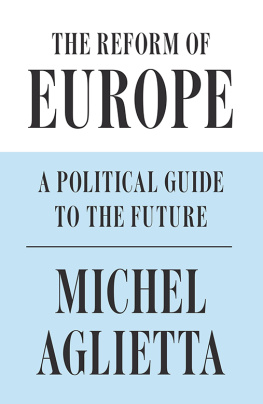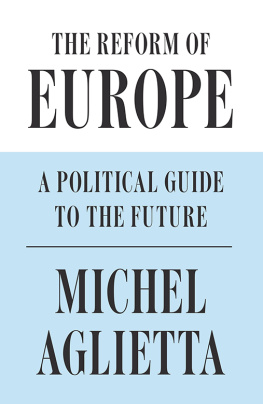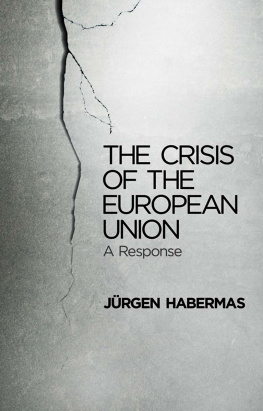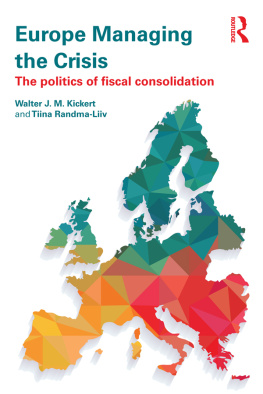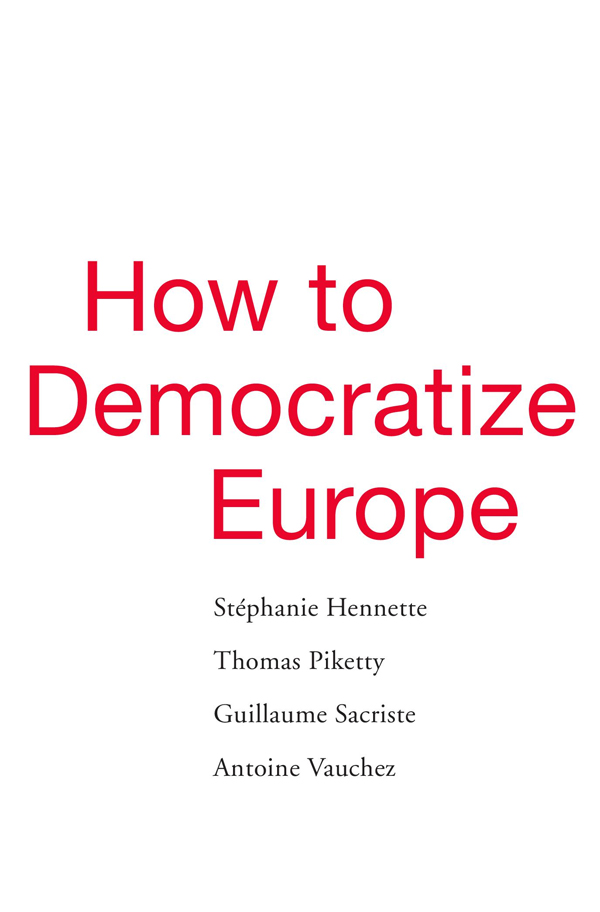Contents
Guide
Pagebreaks of the print version
HOW TO DEMOCRATIZE EUROPE
Stphanie Hennette
Thomas Piketty
Guillaume Sacriste
Antoine Vauchez


Cambridge, Massachusetts London, England
2019
Copyright 2019 by the President and Fellows of Harvard College
All rights reserved
978-0-674-98808-8 (alk. paper)
978-0-674-23962-3 (EPUB)
978-0-674-23963-0 (MOBI)
978-0-674-23961-6 (PDF)
The were originally published in French as Pour un trait de dmocratisation delEurope, Editions du Seuil, 2017.
was originally published in French as Stphanie Hennette, Thomas Piketty, Guillaume Sacriste, and Antoine Vauchez, Pour un trait de dmocratisation de lEurope. Pourquoi ? Comment? in Do You Law? Politique, Justice, Liberts. Libration, April 13, 2017.
was originally published as Stphanie Hennette-Vauchez, Thomas Piketty, Guillaume Sacriste, and Antoine Vauchez, European parliamentary sovereignty on the shoulders of national parliamentary sovereignties: A Reply to Sbastien Platon in Verfassungsblog, March 3, 2017.
was originally published as Stphanie Hennette, Thomas Piketty, Guillaume Sacriste and Antoine Vauchez, Politicizing Europe, Europeanizing Politics in Books & Ideas, October 5, 2017.
reprints text posted at tdem.edu as Manifesto for the Democratization of Europe, a project coordinated by a group composed of Manon Bouju, Lucas Chancel, Anne-Laure Delatte, Stphanie Hennette, Thomas Piketty, Guillaume Sacriste, and Antoine Vauchez.
The Library of Congress has cataloged the printed edition as follows:
Names: Hennette-Vauchez, Stphanie, author. | Piketty, Thomas, 1971- author. | Sacriste, Guillaume, 1972- author. | Vauchez, Antoine, author.
Title: How to democratize Europe / Stephanie Hennette, Thomas Piketty, Guillaume Sacriste, Antoine Vauchez.
Other titles: Pour un trait de dmocratisation de lEurope. English
Description: Cambridge, Massachusetts : Harvard University Press, 2019. | Includes index.
Identifiers: LCCN 2019000529
Subjects: LCSH: DemocratizationEuropean Union countries. | DemocracyEuropean Union countries. | European Union countriesPolitics and government21st century. | European Union countriesEconomic policy. | PopulismEurope. | EqualityEurope. | Right-wing extremistsEurope.
Classification: LCC JN40 .H4613 2019 | DDC 320.94dc23 LC record available at https://lccn.loc.gov/2019000529
Contents
Born in the urgency of a French presidential campaign, presented and discussed in the midst of a rich European election year that saw a succession of elections in the three principal economies of the eurozonein France (May 2017), Germany (September 2017), and Italy (March 2018)the proposed international Treaty on the Democratization of the Governance of the Euro Area, or T-Dem, has been the subject of a lively and rich debate since its appearance. It must be said that the terrain of the reform of the European Union is in every way a field of land mines, above all for those who seekas we have sought in the framework of the T-Demto surpass the ritual opposition of sovereigntist and federalist viewpoints. Because the T-Dem was quickly translated into German, Catalan, Italian, Greek, Dutch, Portuguese, Serbian, and Turkish, it has been possible to discuss the proposal in a multiplicity of political meetings, academic conferences, blogs, and journals at the national as well as at the European level. This is indeed what we wanted in seeking to get the debate on the future of Europe out of the technocratic ruts into which it has too often fallen.
This book aims to partly restore these exchanges. In this sense, this volume is much more than a simple English version of the treatywhich, it is true, was still lacking. Enriched by a historical perspective on the conditions of the emergence of the eurozone, it also includes a very diverse array of contributions and reactions presented by academics (jurists, political scientists, economists) and politicians (German, Belgian, French, Greek, Dutch, and Portuguese). Far from being panegyrics, the contributionshowever briefare focused on the project, investigate its democratic potential, question its feasibility, and propose possible future adjustments.
It will be said that much has changed since the T-Dem first appeared. Certain political givens presented in the bookbeginning with the balance of progressive and conservative forces (see or the litany of reports, notes, and other proposals for reform that soon enough relegated to the back burner the democratic reform (which Emmanuel Macron at one time timidly put forth), to the benefit of a consolidation of the technocratic structure of the government of the eurozone. As if the fragile European economic recovery was enough to make one forget the profound democratic crisis the European project is going through.
The T-Dem will appear to some more utopian than ever. Sure. For if it is a utopia, it is a concrete utopia, in the sense that the late Erik Olin Wright gave this expression: a project that, in revealing another European possibility, casts a harsh light on the gap that exists between the big words of European democracy (democratic government, accountability, and so on) and the reality of the practices of the eurozone government. It is also a project that, in seeking to surpass the partitioning of disciplines that so often prevails in reflections on the European question, must stimulate not only the imagination but also active reformsby showing, against the idea that European treaties would bring about a space of impossibility, that there is in fact some play and margin for a political refounding. Moreover, while this proposal might appear utopian in cold times, when governments dont feel pressured to reform institutions and policies, it might be the only realistic way forward in the heated times of financial and economic crises, when the technocratic injunctions of Eurogroup networks of financial ministers and treasuries collide with newly elected, democratic governments.
Finally, this project is conceived as a work in progress. It is open to revisions, corrections, and additions. Without reviving the distant horizons of abstract utopias that have done so much harm to the credibility of the European project, the T-Dem makes it possible to leave behind the indignation and lamentation that too often monopolize discussions of the European project and to reflect on the practical conditions (political, legal, and such) of its realization. The workshop on democratization regarding the T-Dem project that was open from September 2017 to April 2018 brought together, in thematic sections, students, scholars, NGO activists, and political leaders to reflect very concretely on possible inflections and extensions of the T-Dem.
Our intention in the coming months and years, particularly in the perspective of the upcoming European elections and the subsequent terms of office at the European Commission and the European Central Bank, is obviously to contribute to the enrichment of this proposal, on the basis of these discussions and exchanges. It is not certain, for example, that the reforming ambition needs to be limited to the eurozone alone: with the expanding scope of the European Semester surveillance scheme across the policy spectrum (from structural reforms of labor markets and pensions to issues of competitiveness of national judicial systems, public administration reform, and so on), the eurozone government has become to a large extent EU government


